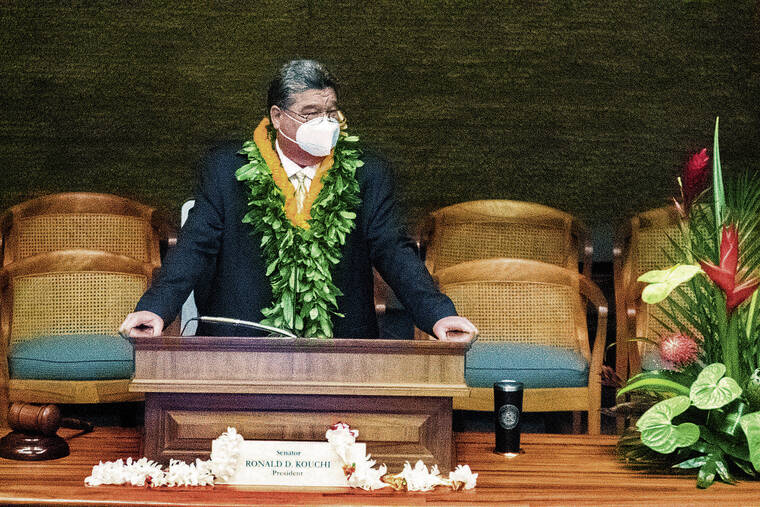Senators in Hawaii’s Legislature opened this year’s first floor session partly in remote fashion, with 18 of 25 members attending the event in person Wednesday at the state Capitol.
There also were no guests because of COVID-19 mitigation measures, and even singer Malia Kaai-Barrett
delivered the national and state anthems via video during the session in the Senate chamber that was broadcast on the Senate’s YouTube channel.
Senate President Ron Kouchi, however, said the mixed in-person and virtual attendance of all members brought invigorating energy to kick off the 2022 Legislature.
“I was disappointed that we were unable to have a gallery full this morning and have friends and family on the floor,” Kouchi said. “I was looking forward to drawing the energy from those in attendance to help inspire the remarks I’m offering today. But I am pleased to report to each and every one of you the energy that you brought to the floor today was invigorating.”
The event, typically accompanied by music, dance, food and gathering before the coronavirus pandemic took hold two years ago, lasted just under a half-hour.
There was also a moment of silence, led by Senate Majority Leader Dru Kanuha, for people affected by Friday’s deadly volcanic eruption off Tonga.
Under Senate rules, the pandemic qualifies as a catastrophic disaster permitting members to attend sessions virtually.
During the Opening Day floor session in the Senate, Kouchi reiterated and elaborated on previously stated legislative priorities for members to address this year, including ways to improve affordable housing, education, local food production, mental health care as well as alleviate homelessness and address the minimum wage.
“While the Senate is concerned in raising the minimum wage, the thing that keeps me up at night is educational or learning loss that will have a generational impact potentially on these young people who will not be able to achieve the goals that they dreamed about because their educational opportunity did not allow them to succeed,” Kouchi said. “And they will see a loss of income over their whole working career. And so we need to make sure that we can deliver that education and have college and community college and vocational avenues available for these young people to succeed.”
On the minimum wage, at a media briefing after the floor session, Kouchi would not specify a preferred dollar amount and timetable for any increase, but said he doesn’t oppose a rise to $18 over multiple years from the current $10.10, which is a goal in the state House.
Sen. Kurt Fevella, the Senate’s lone Republican, said during his speech on the chamber floor that it’s due time for Hawaii’s minimum wage, which last rose in 2018, to rise again.
“I stand ready as I always have to reach across the aisles with my colleagues and work hard with them to support reasonable living wages to boost the economy on our hard-working families,” he said. “This time has come for change.”
Fevella recently joined 13 Democrats in the House and Senate as a member of the newly formed Working Families Caucus, which is introducing a bill to raise the minimum wage to $18 an hour by 2026 while also linking future step-ups to cost-of-living increases.
In recent years, Fevella has been cooler to a minimum-wage hike, expressing concern in 2019 and suggesting that a pilot program start with government workers first. Last year, Fevella voted yes with reservations in an initial hearing on a bill to boost the minimum wage to $12 this year.
Other Senate priorities include a goal of further diversifying Hawaii’s economy so it isn’t as reliant on tourism, reducing domestic violence and addressing climate change.
Many of the Senate priorities focus on chronic issues, some of which have been exacerbated by the pandemic. Still, Senate leaders on Wednesday did not unveil any immense specific proposals in contrast to the House, where leaders on Wednesday pledged to direct $600 million of a projected $1 billion revenue surplus this year to the state Department of Hawaiian Home Lands so the agency can dramatically reduce its backlog of 28,000 Native Hawaiians waiting for homesteads.
Generally, Kouchi suggested that much of the expected surplus could be spent producing more affordable homes and reducing homelessness instead of depositing $1 billion into the state’s Rainy Day Fund as recently proposed by Gov. David Ige.
Tamlyn Kurata, a former collegiate javelin athlete who also attended ‘Iolani School and recently got a job in Kouchi’s office, helped start the Senate floor session as its Opening Day contemplator. Speaking from the floor, Kurata encouraged senators to pursue their work this year with a strong effort that in her sport would equate to throwing with their whole body, not only arms, and hitting their “block” hard.
“They call it the block because you’re supposed to plant your leg so hard that it feels like you’re hitting a wall at the end of your throw,” she said. “And so as we open up this legislative session, let us all become a little bit like javelin throwers. Carry your momentum and strength all the way
to the very end. And don’t forget to hit your block hard.”

